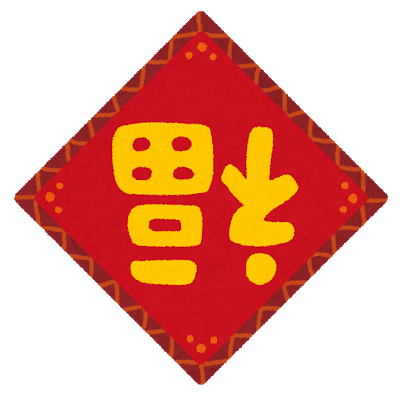新年快乐! Phrases related to Chinese New Year

新年快乐!(Happy New Year)
Today is the day to celebrate the Lunar New Year 2021.
We Japanese don't celebrate the lunar new year, but I learned that many Asian countries value Lunar New Year very much in addition to the international new year. My Chinese and Korean friends, too. So interesting!
For this memo, I picked up some Chinese words related to celebrating a lunar new year.
新年快乐
This is "Happy New Year!" Reads "xīn nián kuài lè."
| Word | Reads | Meaning |
|---|---|---|
| 新 | xīn | New |
| 年 | nián | Year |
| 快乐 (快樂) | kuài lè | Happy |
The "快乐“ is also used to say "Happy birthday!": 生日快乐 (shēng rì kuài lè)
| Word | Reads | Meaning |
|---|---|---|
| 生 | shēng | to be born |
| 日 | rì | day |
| 生日 | shēng rì | birthday |
恭贺新禧
I happen to found "恭贺新年" on the website introducing Chinese phrases, and I was surprised. Because Japanese use the same phrase (恭賀新年) in the new year season. But after searching a lot, I came to guess that it might not be a Chinese phrase; it might be a Japanese one. (I'm not 100% sure though.)
Instead, Chinese phrase goes like this: 恭贺新禧. Meaning "Happy New Year" but this is more formal than "新年快乐." I guess Japanese "恭賀新年" originated from this "恭贺新禧."
| Word | Reads | Meaning |
|---|---|---|
| 恭 | gōng | respectful |
| 贺 (賀) | hè | congratulate |
| 恭贺 (恭賀) | gōng hè | to congratulate respectfully |
| 禧 | xǐ | happiness, congratulations |
I didn't even think about the meaning of "恭賀新年" when I was in Japan. But now I learned this meant a formal way to say "Happy New Year."
恭喜发财
This means "Happiness and prosperity." As a New Year greetings, it means "May you have a prosperous New Year!"
| WORD | READS | MEANING |
|---|---|---|
| 恭 | gōng | respectful |
| 喜 | xǐ | happiness, delight, to like |
| 恭喜 | gōng xǐ | congratulations |
| 发 (發) | fā | to send out, to show (one's feeling), to develop |
| 财 (財) | cái | money, wealth, property |
| 发财 (發財) | fācái | to get rich |
I've learned each meaning from a dictionary, making me feel even more glad that my friend gave these words to our family. Feeling like the power of the words is now protecting us and leading us to a great future. Thank the dear friend:)
Upside-Down "福"

Have you ever seen upside-down "福" decoration?
When I first saw this at my Chinese friend's home, I felt it really weird. Because "福" means "happiness, blessing, or good luck, etc." Placing it upside-down looked to have a bad meaning, to be very honest.
But it turned out that there was a great meaning behind this!
In Chinese, "Upside-down: 倒 (dào)" and "to arrive: 到 (dào)" have the same sound. So, upside-down "福" could mean "The 福 arrives" or "福 is here" in other words.
| 倒 (dào) | upside-down |
| 到 (dào) | to arrive |
There are many stories regarding the origin of this decoration, but I like this one the most:
It is said that in the Ming dynasty, the Emperor ordered every household to decorate by pasting fu onto their doors. On New Year’s Day, he sent soldiers to check. They found that one illiterate family pasted the word upside down.
The Emperor ordered the family to be punished by death. Thankfully, the Empress was there and came up with an explanation: “Upside down” (倒 / dào) is a homophone of “here” (到 / dào). When it’s upside down, it means that fu is here.
The explanation made sense to the Emperor and he set the family free. From then on, people would hang the word upside down, both for fortune and in remembrance of the kind Empress.
Chinese New Year — https://chinesenewyear.net/myths/
What a witty Empress.
Fascinating. I'm feeling like to visit China again and know more about their culture.
🎉 新年快乐!恭喜发财!🎉